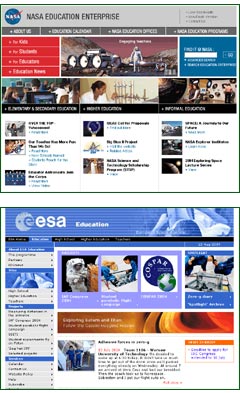 Space education is well advanced among citizens in the United State thanks to the long-term efforts of the National Aeronautics and Space Administration (NASA) in cooperation with various domestic educational organizations. People's interest in space is so intense in the US that it is often used in politics, like when President George W. Bush recently announced a manned flight program to Mars. Many teaching materials are developed for each school grade. There are some other examples of educational opportunities: some portion of the onboard equipment area of a sounding rocket is offered to a high school student program, and an antenna for deep space is lent to high school students (for practicing antenna operation and analyzing received data.) These are just a few examples, as space education in the U.S. is too diversified to completely cover all the information.
Space education is well advanced among citizens in the United State thanks to the long-term efforts of the National Aeronautics and Space Administration (NASA) in cooperation with various domestic educational organizations. People's interest in space is so intense in the US that it is often used in politics, like when President George W. Bush recently announced a manned flight program to Mars. Many teaching materials are developed for each school grade. There are some other examples of educational opportunities: some portion of the onboard equipment area of a sounding rocket is offered to a high school student program, and an antenna for deep space is lent to high school students (for practicing antenna operation and analyzing received data.) These are just a few examples, as space education in the U.S. is too diversified to completely cover all the information.
In the case of Europe, the European Space Agency (ESA) approved at a board meeting in 2000 to appropriate 1% of its total annual budget for education. The European Sounding Rocket Range (ESRANGE) in Sweden and the Andoya Rocket Range in Norway are used as educational sites at the expense of ESA. The challenge for the ESA of late is to ensure all European teachers know about the ESA space education programs.
Above photo
NASA education website(http://education.nasa.gov/)
Right photo
ESA education website(http://www.esa.int/esaED/index.html)

Many academic meetings and international symposiums have recently held educational sessions. For example, at the symposium for small rockets and balloons sponsored by ESA in Switzerland last year, one day out of the four days was allocated for space education. An educational session was also held for a day and a half at the Committee on Space Research in Paris in July this year. Some domestic academic societies, such as the academic society of astronomy, also have an educational session. The necessity of space education is dramatically emphasized by the declining interest in science among students worldwide.

